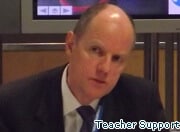Parents should retain the right to take their children out of sex education classes if they wish to, the schools minister has said in Parliament.
Nick Gibb was speaking to a House of Lords Select Committee about the Government’s internal review of Personal, Social, Health and Economic education (PSHE), which includes elements of sex education.
He said it was “important to take parents’ views into account” because it is not just about whether sex education “is taught but about when it is taught and the right of parents to withdraw their child from certain aspects of PSHE.”
“Transparent”
He said that it is parents, not the state, who are ultimately raising their children.
“My concern is about parents and to make sure that we reflect their views in the laws that we pass about their children”, he said.
“Everything we do will be transparent,” he added. “Within PSHE, particularly sex and relationship education, there are extremely sensitive issues and parents up and down the country have very differing views; it is the responsibility of ministers accountable to Parliament to balance those different views”.
He said: “The purpose of the review is how we can improve the teaching of PSHE across the maintained school system”.
Consultation
When questioned by the committee’s chairman Lord Fowler, Mr Gibb said: “There isn’t a set body of knowledge attached to a subject like PSHE as there is with history or physics or chemistry”.
He elaborated by saying that it was not appropriate for PSHE to be included in the National Curriculum review, so it “initially needs an internal review and eventually much wider consultation.”
But committee members challenged Mr Gibb and urged him to make PSHE a mainstream subject.
Opportunity
Baroness Hussein Ece, who sits on the Equality and Human Rights Commission, said: “It is important that this is a mainstream subject and should be treated as such rather than worrying about what the media might say and some sections of society.”
Another member said by holding an internal review the government was missing an opportunity to have a national debate.
But Mr Gibb denied that the government was being secretive, insisting that the review would eventually go out to wider consultation.

